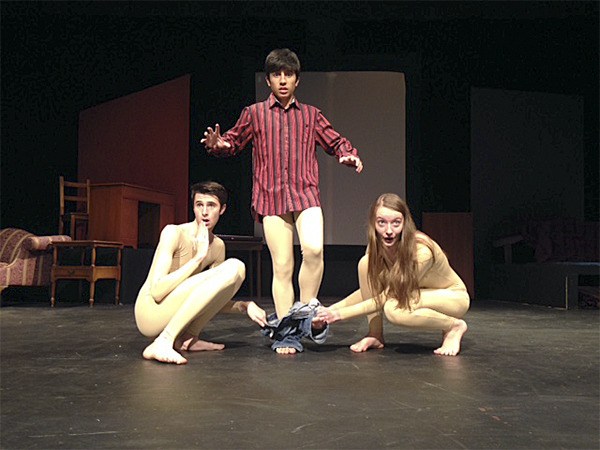SUSAN MCCABE
For The Beachcomber
Watching “Speech & Debate,” this year’s opening play for the Vashon High School drama season, people may think they’re seeing a show about what The New York Times described as “a dark comedy (that seems to be) about a frumpy girl, a nerdy guy and an openly gay guy who band together to disclose the truth about a teacher who preys on his male students.” But as the story unfolds, it is much more about adolescent isolation and misinformation as it is amplified in the Internet age.
The three main characters are kids left with only their own insufficient devices to deal with profoundly adult issues. Howie, played by Miles Wingett, is an openly gay senior new to the Salem, Oregon, high school that is the story’s backdrop. At 18, he’s also new to the Internet hook-up world of gay men and testing those murky waters.
Solomon, played by Xavier Ajeto, is an ambitious young reporter for the school newspaper, who is virtually obsessed with “grown-up” news stories about scandalous behavior among community leaders, specifically the town’s mayor. “Why can’t we write about the truth?” he laments. Thwarted in his investigation by his journalism advisor, Solomon sets out on his own to search online for details to back up the sordid story.
Diwata, played with great comic skill by Joy Ghiglieri, is a theatrical wannabe stuck between serious adolescent problems and equally potent adult ambition. Through her online blog, Diwata accidentally links the three main characters in a joint effort to expose a predatory teacher in their school — with an unconventional group interpretation at, of all places, a debate tournament.
This play is a must-see for all parents of adolescents. Playwright Stephen Karam’s skill with teen dialogue provides striking insight into their world of secrets borne of confusion. Adults in the play are either absent, adversarial or predatory; no one seems to be there for these struggling kids. And yet, they somehow manage to triumph over individual difficulties through an awkward camaraderie. That’s where the music comes in … and out.
Yes, amid the adolescent angst a few songs burst forth, adding both comic absurdity and in-your-face clarity about the alarming points of the story. Among them is easy Internet access to our complex culture, which places social burdens on teens’ narrow young shoulders that far outweigh their capacity to manage the consequences of participation.
Another chilling surprise with this production is the skill with which the cast handles the plays’ very candid material. The three protagonists evolve their characters subtly, making excellent use of Karam’s script. Wingett adds dimension to his character as he reveals Howie’s quiet heroism. Ajeto so slowly exposes his character’s secrets that the audience is truly surprised. And Ghiglieri’s Diwata is the glue to both plot and character progression as she puts a light-hearted and dignified face on genuine pain.
Despite what would appear to be gigantic roadblocks to emotional survival, all three characters triumph in the end, no thanks to the adults in their lives. Those adults are aptly portrayed by Jevne Meyers onstage and Isaac and Ellie Hughes off stage, as the voices of overwrought parents. Stephen Floyd, longtime drama instructor at VHS, selected and directed the play after seeing its West Coast premiere at the Seattle Repertory Theatre in 2010. His goal with this choice, he said, was to produce “a realistic play with teenage characters so that students could take on the challenge of creating characters based on their own experiences and emotional lives — something very different from the musicals, absurd comedies and mythic stories we’ve done in the last few years.”
This kind of script does challenge young actors to bring portions of their real selves to a performance, and this young cast does an admirable job of that in “Speech & Debate.” You’ll leave the theater talking about this one for quite a while.
“Speech & Debate” plays at the VHS theater at 7:30 p.m. Friday and Saturday and 2:30 p.m. Sunday. Tickets are $5.


